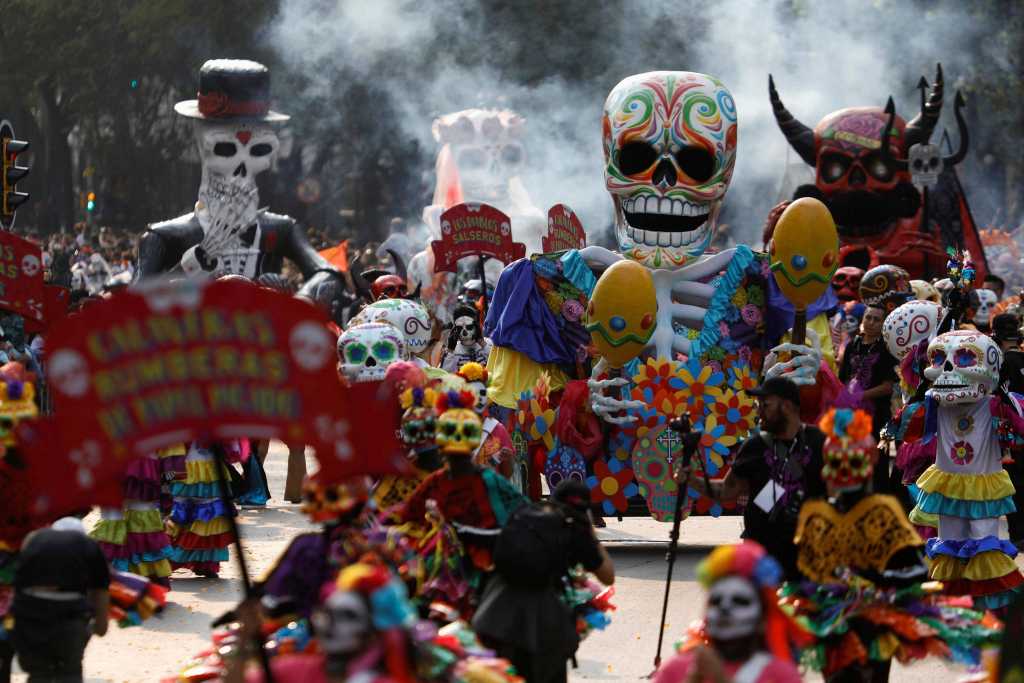What is Día de los Muertos?
Day of the Dead (Día de los Muertos) celebrated in Cabo and throughout Mexico, is an essential part of Mexican culture that integrates prehispanic, colonial and mestizo traditions. It is celebrated to honor the memory of the deceased relatives during the beginning of the Catholic holy season of the All Saints’ Day (November 1). People pray for their departed loved ones at home altars or visit family grave sites. They reflect on their lives, tell jokes and share memories.
On All Souls Day (November 2) people meet with friends and family to remember those who have died, setting up private altars with favorite foods, drinks, photographs and memorabilia, while sharing stories about their lives.
The altars, known as ofrendas, are where families remember their deceased loved ones. The colorful skull-shaped sugar cookies called calaveras are placed on these altars. People bake a special sweet bread called Pan de Muerto, paint skulls on their faces, and dress in vibrant national clothes. While celebrations can be seen throughout the cities and towns and there are often parades, the main action takes place at cemeteries, lavishly decorated for the occasion.
Dia De Los Muertos is a celebration of life and remembrance, not death. Travel around Mexico and you’ll see colorful flowers and other symbols honoring family members who have passed away. The celebrations are as much about finding meaning in death as they are celebrating those who have lived.
Do They Celebrate Day Of The Dead In Cabo?
Day of the Dead is a holiday that’s celebrated all around Mexico, but nowhere do people honor this ancient tradition quite like in Los Cabos. People travel here from all over the world every November to experience its unique culture, food, sights, and sounds.
As you walk the streets of Cabo San Lucas, Todos Santos, and San Jose del Cabo, you’ll find all sorts of decorations put up by businesses and residences alike to show their love for this holiday. You can even find statues of “The Catrina”, traditional iconography representing the Mexican people, all over the city. If you’re interested in learning about the history behind Day of the Dead then you can visit one of Los Cabos’ many cultural centers which often hold festivals honoring the holiday during this time.
If you are visiting Los Cabos during the religious holiday Dia De Los Muertos, there are a few different ways that you may see the locals celebrating, they may be:
- Visiting the graves of their loved ones;
- Having a picnic at the cemetery where their loved ones rest;
- Baking “pan de muerto”;
- Setting up an altar in their home;
- Making sugar skulls;
- Hosting a “Day of the Dead” feast;
- Attending a “Day of the Dead” parade; and
- Dressing up as a Catrina or Catrín.
While tourists are welcome to witness and come and celebrate these special days, Mexican culture and traditions vary from region to region, and because the holiday is sacred, it’s respectful to be considerate when taking pictures during Day of the Dead celebrations and ask for permission first.
Is Halloween Celebrated in Cabo San Lucas?
Halloween celebrations in Cabo aren’t as prevalent as in the States, however the locals have picked up on the ghoulish nature of the holiday and follow suit with some fun activities. In fact, with a tourist-heavy population, Mexican resorts know the importance of Halloween and chances are that you’ll find a fun event or costume party on October 31.
However, while Halloween focuses on monsters, ghosts and all things spooky – Dia De Los Muertos is about honouring friends and loved ones that have passed on and a celebration of life, and the two holidays are not the same thing.
The rich and vibrant cultures and traditions of Mexico, such as The Day of the Dead, are just one of the reasons why Oceanside Real Estate feels so blessed to call Los Cabos, Mexico home and why more and more people, tourists and snowbirds alike are flocking to Mexico each year.

